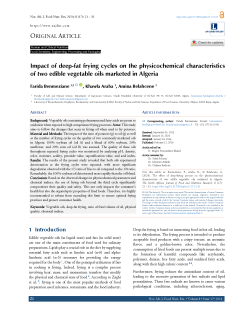Main Article Content
Impact of deep-fat frying cycles on the physicochemical characteristics of two edible vegetable oils marketed in Algeria
Abstract
Background: Vegetable oils containing polyunsaturated fatty acids are prone to oxidation when exposed to high-temperature frying processes. Aims: This study aims to follow the changes that occur in frying oil when used to fry potatoes. Material and Methods: The impact of the ratio of potatoes (g) to oil (g) as well as the number of frying cycles on the quality of two commonly marketed oils in Algeria: 100% soybean oil (oil A) and a blend of 60% soybean, 20% sunflower, and 20% corn oil (oil B) was assessed. The quality of these oils throughout repeated frying cycles was monitored by analyzing pH, density, color, moisture, acidity, peroxide value, saponification value, and acid index. Results: The results of the present study revealed that both oils experienced deterioration as the frying cycles were repeated, with more significant degradation observed with the 1/5 ratio of fries to oil compared to the 1/8 ratio. Remarkably, the 100% soybean oil deteriorated more rapidly than the oil blend. Conclusion: Based on the observed changes in physicochemical parameters and chemical indices, the use of frying oils beyond the third cycle significantly compromises their quality and safety. This not only impacts the consumer’s health but also the organoleptic properties of fried foods. Therefore, it is highly recommended to refrain from exceeding this limit to ensure optimal frying practices and protect consumer health.







